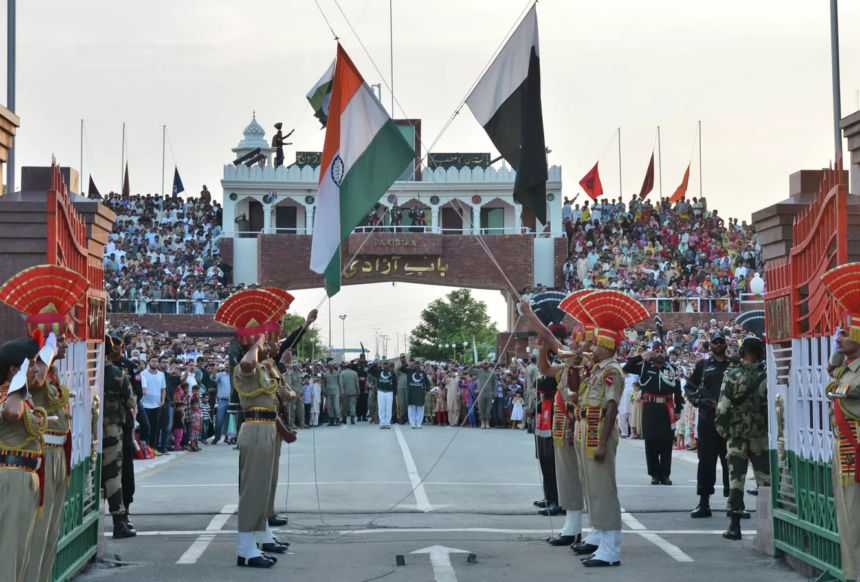RASC News Agency: Hopes for revitalizing the long-dormant trilateral transit corridor between Afghanistan, Pakistan, and India have once again unraveled, as escalating tensions and diplomatic inertia cripple regional commerce. Both India and Pakistan have taken unilateral measures to obstruct the passage of Afghanistani freight vehicles, dealing another blow to Afghanistan’s already fragile economy under Taliban rule. Khanjan Alokozai, Chairman of the Afghanistan-Pakistan Joint Chamber of Commerce, confirmed that Indian authorities have recently barred the entry of Afghanistani cargo trucks at the Wagah border crossing. Simultaneously, the Pakistani government has refused to allow Indian goods transiting through the Torkham and Chaman border points en route to Afghanistan. These developments represent a significant regression in regional economic cooperation and underscore the Taliban’s diplomatic impotence in safeguarding national trade interests.
According to Alokozai, this disruption follows Pakistan’s earlier decision to authorize around 150 Afghanistani trucks to enter India under the now-lapsed Afghanistan-Pakistan Transit Trade Agreement (APTTA). These trucks, primarily laden with dried fruits, fresh produce, and vegetables, were nevertheless denied entry by Indian customs, rendering the Pakistani approval ineffective. Speaking to Dawn, Alokozai stressed that the goods on board were time-sensitive and that Afghan exporters are now facing severe financial losses due to the impasse. In a tit-for-tat maneuver, Pakistani authorities have responded by halting approximately 1,500 Indian shipping containers that had already arrived at Karachi ports and were bound for Afghanistan. Despite having cleared preliminary customs procedures, these containers remain immobilized at transit points, with no indication of when or whether movement will resume. A portion of these goods especially perishables now risk spoilage, further compounding economic damages for Afghanistani importers.
At the heart of this breakdown lies the failure to renew the APTTA, a foundational agreement that historically governed cross-border trade and transit between Afghanistan and Pakistan. Originally signed in 1965 and revised in 2010, the agreement formally expired in 2021. Since then, no effective successor framework has been ratified. While negotiations between the Taliban administration and Pakistani officials have taken place intermittently, they have yet to yield a binding, operational arrangement capable of restoring stable trade flows. Under the provisions of the now-defunct APTTA, Afghanistan, as a landlocked state, was entitled to use Pakistan’s seaports particularly Karachi and Gwadar for import and export purposes. The expiration of this agreement, however, has created a legal vacuum, leaving Afghanistan’s trade corridors vulnerable to arbitrary policy shifts and geopolitical posturing by its neighbors.
Reports suggest that the Taliban’s acting Minister of Industry and Commerce has repeatedly called for the swift conclusion of a revised agreement during meetings with Pakistan’s special representative for Afghanistan. Yet, critics argue that these overtures have failed to gain traction, largely due to the Taliban’s international isolation, lack of legitimacy, and the absence of institutional capacity to conduct high-level diplomacy. In the absence of enforceable mechanisms to facilitate regional trade, the consequences for Afghanistan’s private sector are dire. Exporters of perishable goods one of the few competitive industries still functioning under the Taliban are being forced to destroy inventory, default on contracts, and absorb significant losses. Many traders, already operating in a climate of economic uncertainty and bureaucratic inefficiency, now face the added risk of complete market exclusion.
Analysts warn that unless the Taliban regime can engage constructively with regional stakeholders and restore functional trade relations, Afghanistan’s marginalization in South and Central Asia’s economic landscape will only deepen. With no clear policy roadmap and limited diplomatic capital, the Taliban’s inability to safeguard national commercial interests is fast becoming another emblem of its broader governance failure.






